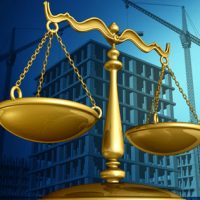Construction Dispute Resolution vs. Construction Litigation

In multiple entries on our blog, we have addressed best practices as it pertains to construction delays and contract disputes. Much of the focus is usually on how to avoid scenarios that may end in litigation or a dispute resolution process. Here, we discuss the scenario where a contractor or an owner has identified an actionable claim and they must determine the best avenue for redress. Some contracts limit a claimant to submit to an alternative dispute resolution process and some others permit the freedom to file an adversary complaint in a court of law.
Construction Dispute Resolution
Parties in dispute who utilize a dispute resolution process are many times mandated to do so per a construction contract. In such document, the parties agree that should a dispute arise in relation to the contract, they will not use normal court processes, but submit to arbitration or mediation. Arbitration is an alternative dispute resolution method with one or more persons hearing a dispute and arriving at a decision. The person tasked to hear the dispute is normally a neutral attorney or judge. Parties are free to make their own rules governing the process in the contract phase. That means parties can select the qualified arbitrators they would like to use beforehand. These arbitrators are usually well-versed in the area of construction law. Many parties agree to arbitration because of the cost-saving factor as compared to a full-fledged litigation.
Construction Litigation
On the other hand, construction litigation is a more involved and lengthy process. The process usually starts with an investigation of the case to determine whether there is substantial evidence to move forward with the case. This process includes the document and record gathering process. This process should not be confused with the discovery process, which is more formalized. After litigation attorneys gather the records and documents, the next step is to draft and file a legal complaint with the court. After a complaint is filed, the case goes to discovery. This is only if the two parties do not decide to settle the case before it goes to that stage. Even after discovery, the parties have an opportunity to request summary judgment to dispose of the case. A summary judgment is a request, made by motion after discovery, where one of the parties contends that all necessary factual issues are settled and so there remains no case to dispute. If the summary judgment motions are unsuccessful, the pre-trial and trial schedule will proceed.
Your Florida Construction Law Attorney
When a construction dispute occurs after a construction project has terminated, you must determine the best course of action to reach a legal result. The first step is to hire an experienced construction law attorney who can advise you on the complex processes of arbitration and construction litigation in Florida. Attorney Brendan A. Sweeney is an experienced construction law attorney with years of experience litigating and advising on construction law disputes. Contact us for a consultation.
Resource:
law.cornell.edu/wex/arbitration
